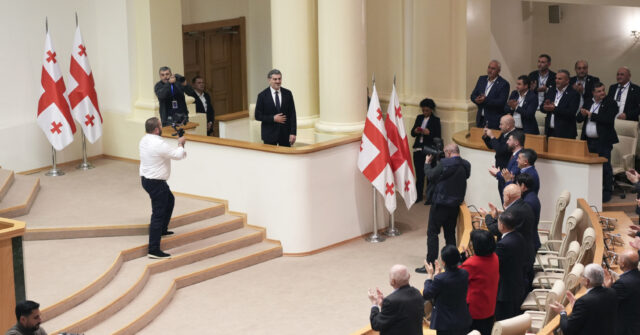Mikheil Kavelashvili, a former soccer player, was inaugurated as the president of Georgia on Saturday, a move that many citizens and opposition leaders see as detrimental to the country’s aspirations for European Union membership. He was the sole candidate on the ballot, winning with ease due to the overwhelming influence of the ruling Georgian Dream party, which controls a 300-seat electoral college that took over the presidential election process in 2017. This election followed recent parliamentary elections on October 26, which the opposition claims were rigged with support from Russia. Following these claims, key pro-Western figures in Georgia, including the outgoing president, are boycotting parliament and calling for new elections.
The Georgian Dream party has consistently insisted that it seeks EU accession, although it is simultaneously working to ‘reset’ relations with Russia. Tensions between Georgia and Russia have historical roots, notably dating back to the brief war in 2008 that resulted in Russia’s recognition of two breakaway regions in Georgia and a significant increase in Russian military presence there. Critics of Georgian Dream, established by billionaire Bidzina Ivanishvili, have charged the party with authoritarian practices and an increasing closeness to Moscow, accusations that the party has denied, arguing for the protection of national interests. Recent legislation akin to measures seen in Russia has sparked protests, signifying a crackdown on free speech and LGBTQ+ rights.
Salome Zourabichvili, who has served as president since 2018 with a pro-Western agenda, has noteworthy roots in France and is known for her previous roles in Georgian diplomacy. As her term draws to a close, Zourabichvili has declared her intention to remain in power, contending she is the only legitimate president until new elections are held. This declaration has fueled divisions within the political landscape, where she accuses Georgian Dream of neglecting the will of the people with their perceived pro-Russian policies and refusal to hold fair elections.
During her tenure, Zourabichvili has been increasingly critical of the ruling party, which attempted to impeach her as tensions escalated. She insists there is no legitimate government in place, emphasizing the need for new elections that can accurately reflect the citizens’ desires. Her statements serve to rally opposition sentiment against Kavelashvili’s ascendance to the presidency, which she derided as a sham and unconstitutional. The leader of the opposition party, Giorgi Vashadze, echoed these concerns, asserting that Zourabichvili remains the only legitimate source of power amidst what they deem a flawed transition of authority.
Despite the legitimacy crisis, government officials maintain that Kavelashvili’s office will foster national unity and stabilize the nation, as articulated by Prime Minister Irakli Kobakhidze. Nevertheless, Kavelashvili himself has faced ridicule regarding his educational background and qualifications for leadership; opposition protests featured demonstrators boasting diplomas and employing soccer-related themes to critique his election. Kavelashvili’s political trajectory has been marked by his contributions to controversial laws that mirror Russian legislation aimed at discrediting NGOs, further alienating him from pro-Western supporters within Georgia.
In response to the government’s suspension of EU accession talks announced on November 28, demonstrators have taken to the streets en masse, demanding accountability and transparency from the government. Protesters experienced police brutality through the use of water cannons and tear gas in their rallies against what they perceive as a significant governmental overreach. Many demonstrators assert their commitment to European integration, viewing Kavelashvili’s rise and the Georgian Dream’s tactics as a direct step back toward Russian influence. Resolved to continue their protests, many express a deep sense of national identity tied to Europe, reflecting the palpable tension between the aspirations of the Georgian populace and their current political leadership.

